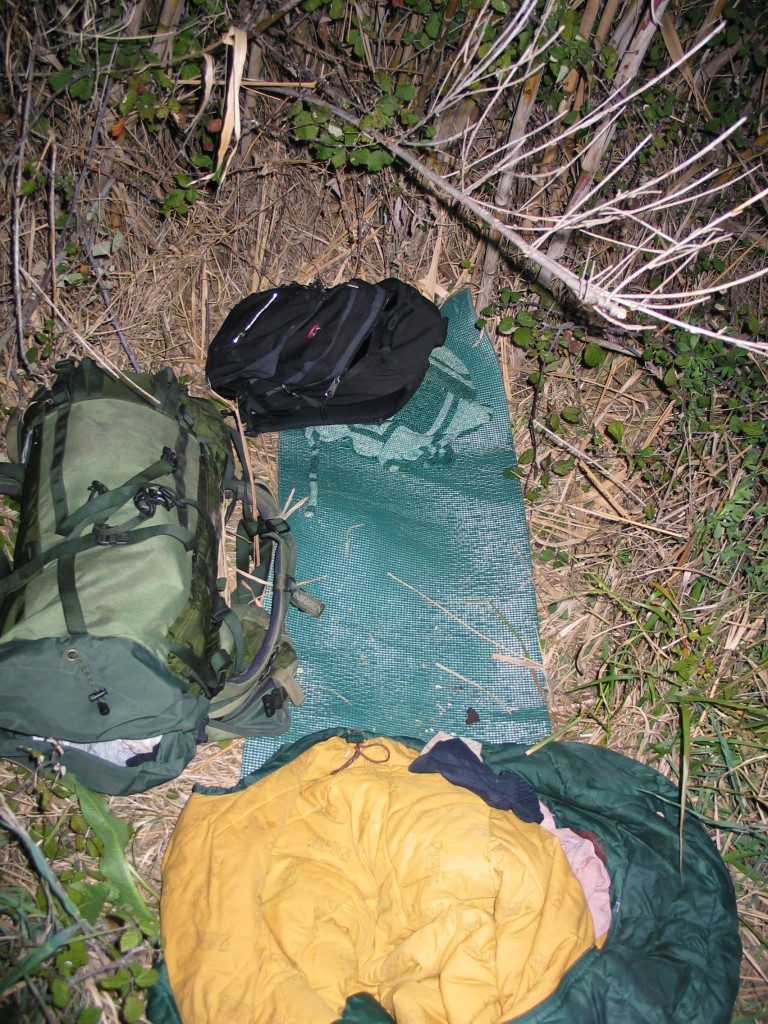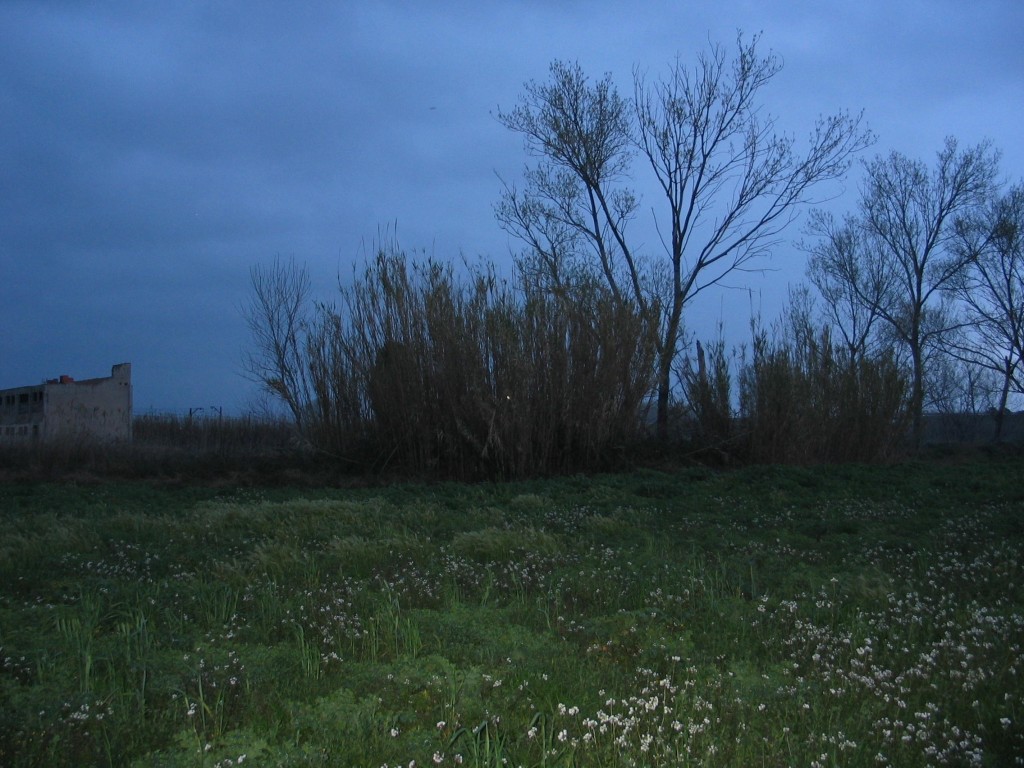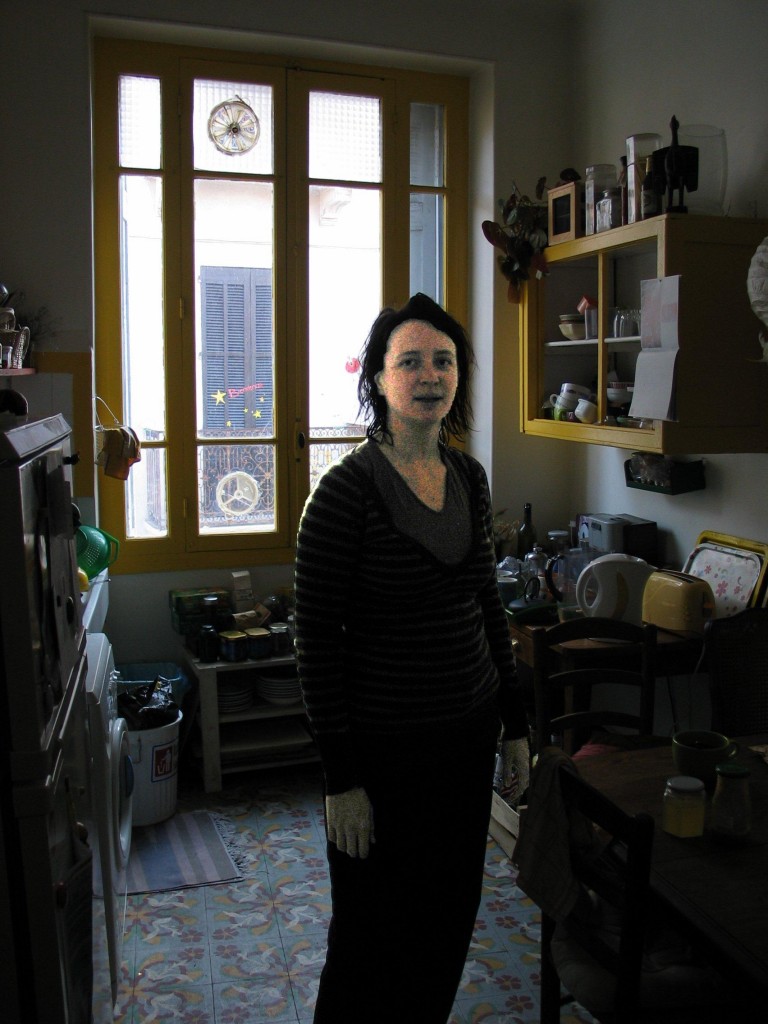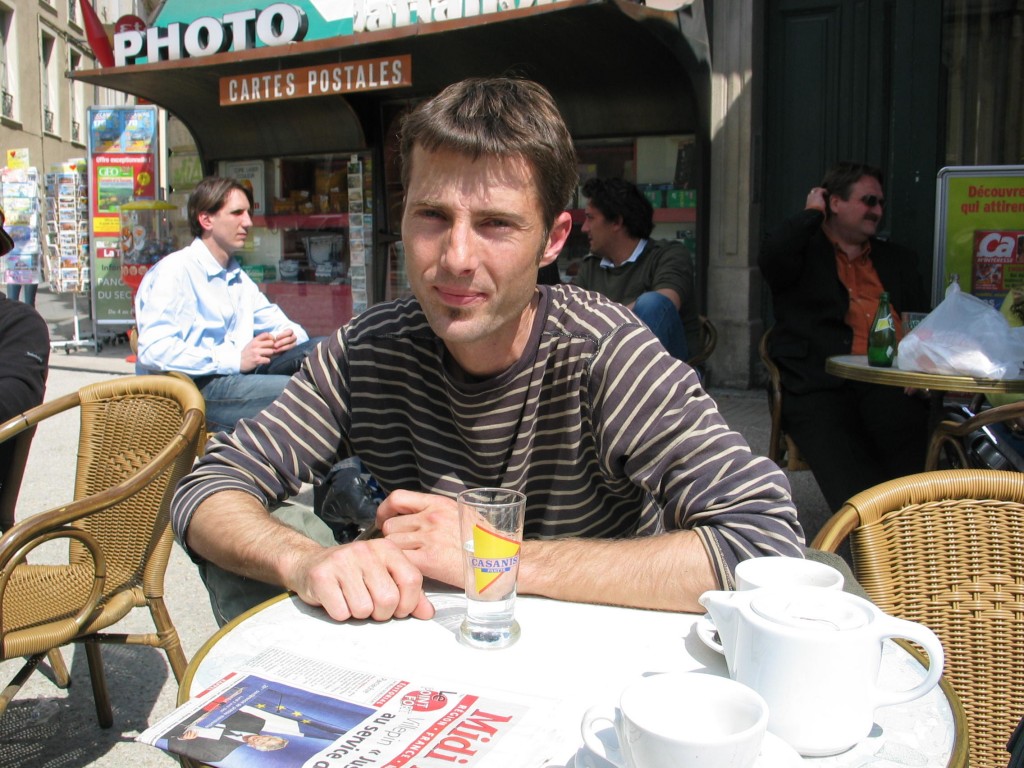Friday last week I finally graduated from the English teacher course I talked about last time. For four weeks I had been stuck in Barcelona, practically having no time for anything else than sitting at “input sessions” in the morning, teaching practices in the early afternoon, guided lesson preparation before and after that for a few hours, and whatever waking time was left was normally spent on preparing various bureaucratic forms that had to be handed in before every lesson — supposedly to show that one has thought about possible questions students might come up with. However, in reality it was more about not leaving spaces anywhere in the forms. Initially, I filled the forms out by computer. Of course, that meant that large parts were left blank and my tutors pointed out that I should write more. I was too naive to understand that what they actually meant was: “Make the form somehow look filled out, it really doesn’t matter what you put there.” Some of my female co-students (we were 10 girls and two boys)were more openly cynical though, and sure enough, following their advice and filling out the forms by hand meant that my tutors henceforth would accept my forms. It was only one part, the so-called “MFP-sheet” (meaning, form, pronunciation), which I continued to hand in as a computer print out for a while longer, and just as long did they complain about it. Also, we had three different tutors, one after the other for 6-7 days each, and they all had their own personal way of filling out these forms. Of course, if you’d fill any form the way one of the other two tutors did it and had taught it to us all in an input session, it would be marked as wrong. Especially for the girls though, this seemed to be perfectly natural, and none of them were great revolutionaries. Somehow also I ended up surviving four weeks of that, and in two months time my Cambridge Certificate in English Language Teaching to Adults (Celta) should arrive at my parents by mail.
In Barcelona I had only had very little time though, so all the activism activity I attended was the 8th of March (world women’s day), an antiwar march on the 17th, and I visited an occupied house a Friday afternoon which I had bumped into while walking to the post office.
So when my time was up on Friday and I had to give up my room on Saturday, I finally got to book a flight back up north. Due to the excessive Easter celebrations all over Spain which are a great tourist attraction, I did not even try to find anything from Spain itself. Instead I found a flight from Marseille, in southern France. The only problem: It wouldn’t leave before Wednesday. From Barcelona to Marseille you can travel within just a few hours of TGV ride, so I had some extra time on my hand. Combining my memories of German national romantic tales, which usually included going to Italy to walk from village to village and become involved in the life of the locals, with my my fascinations for Eric Balir’s Homage to Catalonia and Down and Out in Paris and London, I decided to travel slow and by moving out of the pattern of normal ways of traveling.

This is my journal of a few days of shifting form the very structured environment I had experienced in Barcelona through a few others, some touristy, one activist, one Norwegian and everything between them very much out of the ordinary.
On Saturday I did not go further than Manresa. I used my metro ticket to take the train up there. I went into a bar close the train station and let the bar guests tell me just how crazy my plan was. I walked around for a bit, used the library to get on the net, and ended up going up to a high way in order to find a place to sleep. The most welcoming place I found were the remains of a house very close to the road. It seemed to be in the process of being prepared for being taken down to make way for an extension of the road. It was cold and very dirty, animal feces spread all over the place. Yet, somehow I managed to stay inside the house for 13 hours. Part of the reason was of course that I was afraid of being caught when slipping out through the door; partly it was the rain.
<%image(20070408-IMG_2514_1.JPG|2272|1704|…but I felt it hard to take the dirt.)%>
On Sunday I figured out that it would be impossible to hitch hike due to the way the access to the interstate was controlled. Instead I moved back into town and after ordering a chocolate at something which initially looked like a cafeteria, but turned out to be a bar with guests still hanging around from the night before, I had the owner show me the way to the bus station. From there I went on to the extremely touristy city of Gerona where I sat around the inner city for a while, talking to the people around Wood Cafe. When the weather gave me a break, I started walking north, chatting with the locals at varies cantinas going north. I needed to get out of this ultra touristy place. I walked in the direction of Figueres for about 10-15km. Although I made sure that pedestrians would be allowed on this road (it was an alternative to the interstate going the same direction), I had definitely passed into the zone of walking outside the pattern again. I was the only one walking, and I frequently had to jump out onto the side so i would not be hit by some big truck.
<%image(20070408-IMG_2517_1.JPG|1704|2272|The sidewalk for those wishing to walk north from Gerona.)%>
When I finally got tired, it was starting to get darker and I reached a rest stop where I could wait for the bus for a few hours.
Although they must not have seen any back packers there for a long time, I was almost back in the pattern. I started chatting with the lady behind the bar. She must have been in her late twenties, and had a Latin American word usage. She knew about the bus and at first she sent me to the bus stop where it would arrive at around 21h that night. But then she seemed to reconsider. I read a pamphlet on Allende’s Chile 1971–73 when she came back over and told me that the bus would not come today. She said it in a way that made it clear that she had an alternative plan for what I should do tonight. By then I had told her all about me and that i really was just tramping around for a few days. She was really nervous when talking now, looking into the floor most of the time, briefly checking whether I was still following her about every 10 seconds. She started out speaking fast and delivered her message with such clarity that I was sure she had considered just how to mention this carefully for quite some time. When she was about to reach the end of the pure informational bit and was about to reach the part where I expected her to make her alternative proposal, she suddenly slowed down and looked at me straight. She took a break of a few seconds and when she was about to speak again, I was quite afraid of what was to come now. I panicked; I broke her off; I said “yes it goes.” I knew the bus would go, I had checked the bus schedule and there were no exceptions marked for Easter. I rapidly walked away towards the toilets, not giving her time to respond. When I came back, I said once again that I was sure the bus was going today. She had gotten my hint and now said that she was not sure. “Puh, well handled,” I thought. It was raining pretty badly and had I allowed her to finish her sentence, possibly forbidding me to sleep on the porch of the motel that night in case the bus would not come, I would not be sure where else to go. But the bus came that night. 15 minutes late.

After arriving in Figueres at around 22 Sunday night, I just had to find a place to sleep. I quickly ran into a young man who was heading the same way as me. He turned out to be an immigrant from Senegal, whose French was a lot better than his Spanish. He had expected for me to be French as well (most likely due to my accent in Spanish), and so he seemed somewhat disappointed when I revealed that I do not even speak French. Nevertheless he advised me to break into and sleep in the football stadium to which he walked me. That night I ended instead up sleeping a few hundred meters from there, on a field and next to a bush of bamboo. Background noise was provided by an interstate a few hundred meters behind me and a train line on the other side.

On Monday I took the local train to Portbou from where I could reach French easily within just a few hours of hiking up a mountain and down the other side. I took a train towards Nîmes, from where I had planned to find another field to sleep for the next night. But then in Montpelier, Anne Claire boarded the train and decided to enter my compartment. She is currently interning with an organization specializing in dance for her culture management degree. I had just been drinking with two Scottish guys who had left the train in Montpelier and so I thought I would interview Claire for a while. But it was not before I was taking a shower at the place where she lives with Eric and Fanny in Nîmes though that I realized that she was politically quite close. On the bathroom walls, they had put up all kinds of ATTAC propaganda.
I confronted her with that when I came back to the living room, and she explained how she had given up most hope after having witnessed the power struggles inside ATTAC and the methods some employed. A little while later, Eric came home and also he could confirm her version of how everything had gone. Basically, the had lost most hope to change anything at all. Claire argued: “See, it has always been like that. The bourgeoisie controls. They say it’s democracy, but it’s really just like always. Why would it change?”

Eric and I must have been standing within 200m of one-another one day back in 2000; we both remember “the bridge” in Prague. “The bridge” was the bridge that had been filled with riot police, tanks (or what looked like it to me) stopping us activists from the early anti-globalization movement to invade the IMF/World bank conference fall that year. We both recalled how the Italian organization Ya Basta was dressed like Michelin men, and how we tried to use them to push the police aside. It did not happen and the demonstration ended there. During the night a MacDonald got raided, and a state of emergency was announced which forbid any gathering of more than three people. I remember going with another Norwegian to a downtown bar that day to meet a group of revolutionaries from Finland. We walked about 50m apart in order not to get arrested and to be able to spread effectively if we were to encounter any group of police patrol.
Eric had gone back and when it started, for four years ATTAC and the struggle in general had been Eric’s entire life. Then he had stopped for health reasons and because it became obvious that the ruling would use any kind of violent mean available to fight us off. Claire came to ATTAC after Prague and Genoa, but when the movement was still vibrant. “So this is what it felt like to be a 1068’er in the 1970s…” I summarized our current common experience. Claire suggested: “We can not do anything about the world, but we can do a lot in our personal relationships with those who are close to us.” This seemed to me to be the disastrous medicine the 1968ers had turned to as well, cutting themselves off from society tat large, forming small cells of hidden knowledge of how bad everything is. “I really have a problem with that though,” I said, “five years ago, there were so many people who were conscious. And when I see where several of them have gone now…. I just don’t understand it or them.

We started here, seeing ourselves as the European part of a global movement that with the newly popularized Internet would do away with the global capitalist system with countries being the main form for organization. All that had started the year before, when activists in Seattle, WA shut down the World Trade Conference there. When I speak to my little Douglasites [I had briefly mentioned my trips there earlier], they don’t even have a clue what Seattle 99 is. And the same in Norway. It’s as if they all wiped their brain. I can’t understand them.” Claire agreed. At a recent family gathering she had run into a far distant relative who was working for Reebok: “and he had this naive view of the relation between France and Africa. I had thought that it common knowledge that the French bourgeoisie exploits Africa, and that the French government supports dictators there so that the exploitation can continue. But he… he had this really naive view of it. I tried to explain it to him, but it’s almost as if he didn’t want to understand. It would break with what he does [working for Reebok].”
The discussion went on for a little longer, and I stayed up with Claire to listen to the university radio where she had a reading aloud program at midnight. She had never listened to it herself, and this was the third episode already. “She is still very active,” Eric would say the next day when she was back at work, “but it’s all culture, no politics now.”
The last night I went to a little village two hours outside of Marseille where fellow union militant Erik Nygaard’s parents live. He had seen that I was going to Marseille through Facebook, and had me set up to meet his parents. I was back in the “normalized” Norwegian context.

Johannes Wilm,your blog is perfect and real. I recommened your blog on EbonyFriends.com to my friends and they would enjoy it like me.
Johannes Wilm liker film!Johannes er en reisende kosegris! Johannes er Alf Prøysens ukjente sønn!
Så mye om utendørsovernatting, og så lite om å sove hos en venns familie? Du er ikke helt norsk enda, Johannes. Da hadde det vært omvendt… Du veit, for oss villmarkas sønner er liggeunderlag og sovepose det normale, og det å møte andres slekt og sånn helt på sia. Hehe! Godt å høre du hadde en fin tur!
I find interesting stories from your blog. I wish I could be backpacker too, just want to know how it feels and want to get some new experience as well as friends from other countries.
very nice blog.
i ahve accepted you blog informations.